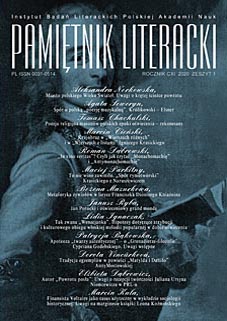Finansista Voltaire jako casus użyteczny w wykładzie socjologii historycznej
Voltaire the Financier as a Useful Casus in a Historical Sociology Lecture
Remarks on the Margin of Leon Koźmiński’s Book
Author(s): Marcin KulaSubject(s): Studies of Literature
Published by: Instytut Badań Literackich Polskiej Akademii Nauk
Keywords: Voltaire; Enlightenment; nobility; aristocracy; businessman; historical sociology; Jews; limits of economic activity of Polish noblemen
Summary/Abstract: In Leon Koźmiński’s book “Voltaire finansista” (“Voltaire the Financier),” Voltaire is presented from an unknown side—not as a philosopher or a poet, but as a businessman. The author of the paper considers the possible aspects of Voltaire’s entrepreneurship that may raise interest of historical sociology scholars. He also pays attention to the merging of the social roles of the entrepreneur and the philosopher, and Voltaire’s mingling into the then political establishment, to the differences between the social and economical landscape of such cities as London, Amsterdam, or Paris, and those of the central Vistula. Impossibility of dealing with money or investments of the Polish nobility contrasted to Voltaire’s activity proves interesting. In Poland at that time a nobleman was to manage a farm or serve the army, while financial activity was given to the Jews, which brought about multiple and long-lasting consequences. From the point of view of historical sociology, it is vital to discern the crucial influence of the state’s central power on the economic activity of the individuals, as well as the ways the then power transferred message to its people, including the entrepreneurs. The author is interested in the forms of activity that were seen as acceptable when making economical decisions. The image of the modern, according to the criteria of its time, farmstead sketched by Voltaire is worthy of attention. A separate issue, also of interest to the historian researching the sociological borderline, is the use of Voltaire’s correspondence in the analysed study. As it is obvious that we lack social opinion material of the old days, employing pieces of information from letters is especially advantageous in spite of the many difficulties that this source poses to its readers.
Journal: Pamiętnik Literacki. Czasopismo kwartalne poświęcone historii i krytyce literatury polskiej
- Issue Year: 111/2020
- Issue No: 1
- Page Range: 217-228
- Page Count: 12
- Language: Polish

